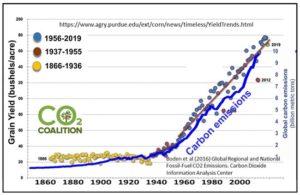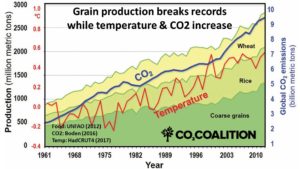What Rising CO2 Means for Global Food Security
What Rising CO2 Means for Global Food Security
Executive Summary
 Plant production has been boosted, the need for water and fertilizer has been brought down, and field experiments show that these effects are likely to increase in coming decades.
Plant production has been boosted, the need for water and fertilizer has been brought down, and field experiments show that these effects are likely to increase in coming decades.
Global food security is one of the most pressing problems facing the planet’s growing population. Continuing advances in agricultural technology and expertise will certainly increase food production in many regions, but the required doubling of production by 2100 as diets improve with rising income will still be a difficult task. Fortunately, carbon dioxide (CO2), a non-polluting gas that is created when fossil fuels are converted into energy, has proved to be a powerful plant food.
Just as it does in commercial greenhouses every day, the CO2 that has been added to the atmosphere has already “greened” the planet. Since 1900, crop production has been increased on the order of 15 to 30 percent. This White Paper’s detailed review of the latest field research shows that this effect will only improve as carbon dioxide continues to rise from four percent of one percent of the atmosphere today to, perhaps, six percent of one percent in 50 years. In addition to boosting yields per unit of land area, CO2 also boosts yields per unit of fertilizer applied and water used.
In regions where food shortages persist, these enhancements by industrial CO2 will mean the difference between food security and food insecurity. They will aid in lifting hundreds of millions of people out of a state of hunger and malnutrition, preventing widespread starvation and premature death.
Society did not intend to boost plant productivity when it began using fossil fuels to power its drive to the wealth that has dramatically improved both personal health and the environment. However, now that the energy bonus of fossil-fueled CO2 for agriculture has become well-established science, governments should promote research into crop varieties that perform best in enhanced CO2 and be very cautious about restricting emissions of this non-polluting gas.
The clear benefits to humanity of plant fertilization by industrial carbon dioxide, let alone the wealth generated by the burning of fossil fuels that creates CO2 as a byproduct, must of course be weighed against predictions of the potential costs. These are the well-known predictions, generated by computer models, of CO2-driven warming leading to climate catastrophes. However, the modest, one-degree Celsius rise in average temperature since 1900, due to what all modelers acknowledge is a mixture of natural and industrial causes, has had a negligible effect to date on climate variables such as the rate of the rise of sea level, and the frequency of droughts and hurricanes. (Curry, 2018, pp. 70-72; Pielke Jr., 2017, Appendix B)
 Some have begun to claim that increased CO2 will greatly reduce the nutritional value of crops. A study promoting this narrative was published in 2018 by researchers at the Harvard School of Public Health, using this headline: “As CO2 Levels Rise, Millions at Risk of Nutritional Deficiencies.”1 Field experiments have long shown that a few crops deliver perhaps five to ten percent less zinc, iron, and protein per unit of mass when carbon dioxide levels are increased from today’s levels to those predicted in 50 years. However, as the Harvard researchers acknowledge, because of economic growth people have been “dramatically” and “significantly” increasing their wealth and hence improving their diets for years.
Some have begun to claim that increased CO2 will greatly reduce the nutritional value of crops. A study promoting this narrative was published in 2018 by researchers at the Harvard School of Public Health, using this headline: “As CO2 Levels Rise, Millions at Risk of Nutritional Deficiencies.”1 Field experiments have long shown that a few crops deliver perhaps five to ten percent less zinc, iron, and protein per unit of mass when carbon dioxide levels are increased from today’s levels to those predicted in 50 years. However, as the Harvard researchers acknowledge, because of economic growth people have been “dramatically” and “significantly” increasing their wealth and hence improving their diets for years.
Hence, a small decline in nutrients in a few crops, which in any event would be more than offset by the CO2 boost to production, is hardly likely to cause such a nutritional crisis. The researchers themselves acknowledge that plant breeding, modified fertilizers, and new growing methods can reverse any nutritional decline. However, they unrealistically decided to freeze wealth, diets, and agricultural methods at today’s levels in their computer model’s predictions of the future. That is what generated these dramatic but unfounded claims about “millions” being harmed.
The principal researcher for this White Paper is Craig D. Idso, chairman of the Center for the Study of Carbon Dioxide and Global Change and a member of the CO2 Coalition. Dr. Idso has advanced degrees in both agronomy and climatology and is one of the world’s pre-eminent scholars of carbon dioxide’s impact on agriculture. The paper has been written for a general audience, but the relevant scientific studies are cited at every step and are included in the bibliography.
This CO2 Coalition White Paper is available for free download here: What Rising CO2 Means for Global Food Security
